International Baccalaureate Assessment Principles: MYP & DP Programs
VerifiedAdded on 2022/08/21
|12
|3645
|27
Essay
AI Summary
This essay provides a comprehensive overview of the International Baccalaureate (IB) assessment principles, focusing on the Middle Years Programme (MYP) and the Diploma Programme (DP). It explores the commonalities and differences between the two programs, emphasizing their role in preparing...
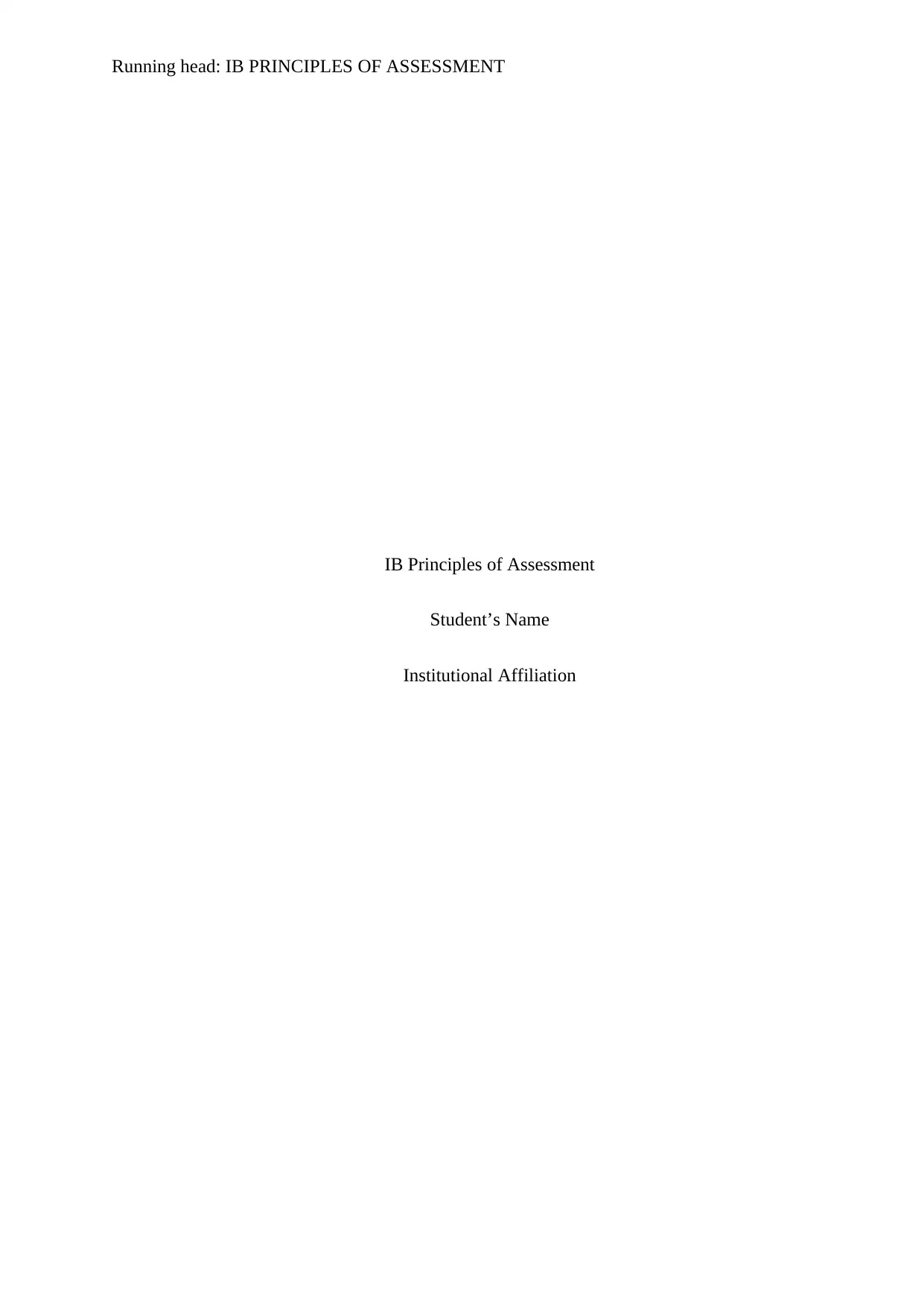
Running head: IB PRINCIPLES OF ASSESSMENT
IB Principles of Assessment
Student’s Name
Institutional Affiliation
IB Principles of Assessment
Student’s Name
Institutional Affiliation
Paraphrase This Document
Need a fresh take? Get an instant paraphrase of this document with our AI Paraphraser
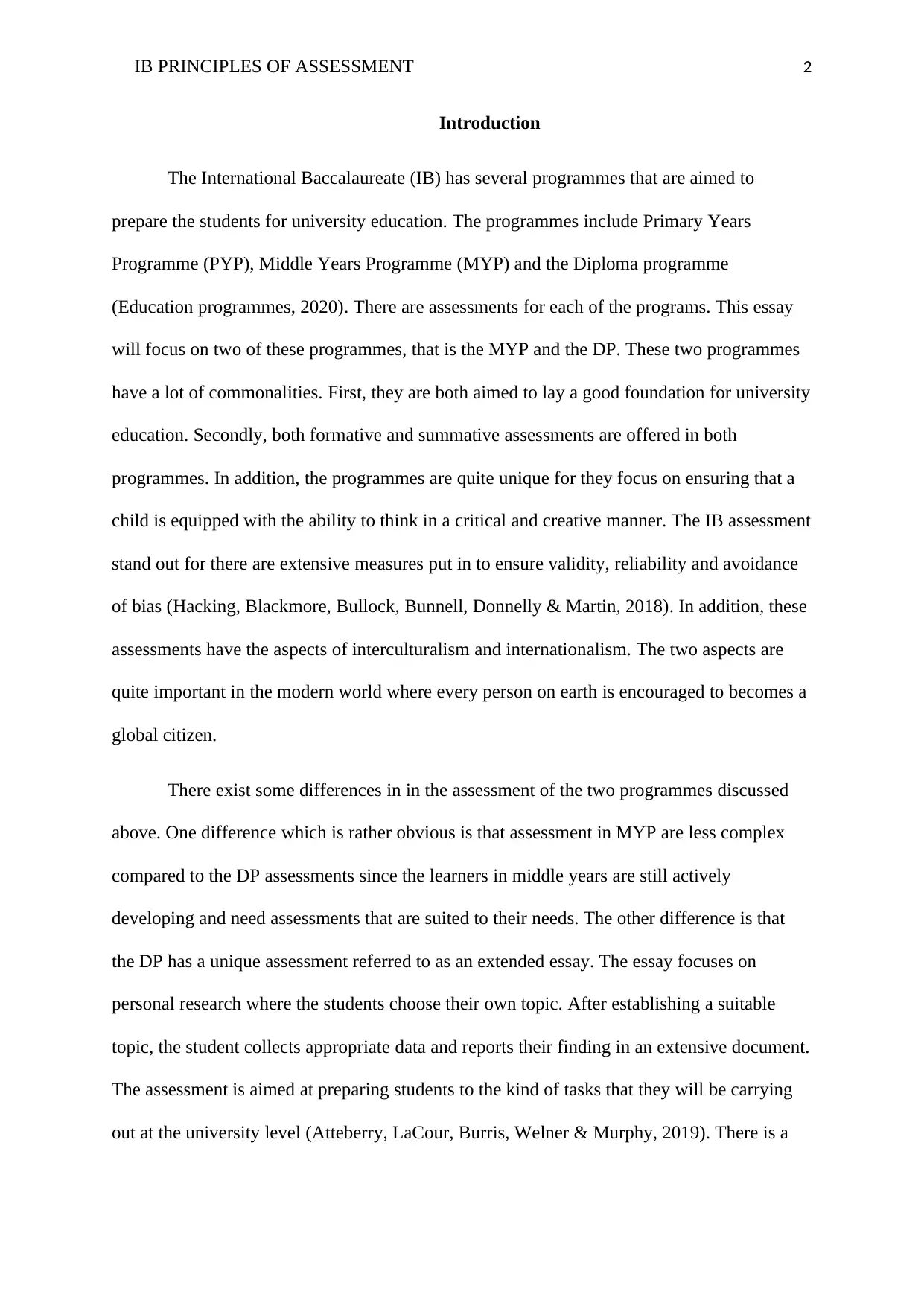
IB PRINCIPLES OF ASSESSMENT 2
Introduction
The International Baccalaureate (IB) has several programmes that are aimed to
prepare the students for university education. The programmes include Primary Years
Programme (PYP), Middle Years Programme (MYP) and the Diploma programme
(Education programmes, 2020). There are assessments for each of the programs. This essay
will focus on two of these programmes, that is the MYP and the DP. These two programmes
have a lot of commonalities. First, they are both aimed to lay a good foundation for university
education. Secondly, both formative and summative assessments are offered in both
programmes. In addition, the programmes are quite unique for they focus on ensuring that a
child is equipped with the ability to think in a critical and creative manner. The IB assessment
stand out for there are extensive measures put in to ensure validity, reliability and avoidance
of bias (Hacking, Blackmore, Bullock, Bunnell, Donnelly & Martin, 2018). In addition, these
assessments have the aspects of interculturalism and internationalism. The two aspects are
quite important in the modern world where every person on earth is encouraged to becomes a
global citizen.
There exist some differences in in the assessment of the two programmes discussed
above. One difference which is rather obvious is that assessment in MYP are less complex
compared to the DP assessments since the learners in middle years are still actively
developing and need assessments that are suited to their needs. The other difference is that
the DP has a unique assessment referred to as an extended essay. The essay focuses on
personal research where the students choose their own topic. After establishing a suitable
topic, the student collects appropriate data and reports their finding in an extensive document.
The assessment is aimed at preparing students to the kind of tasks that they will be carrying
out at the university level (Atteberry, LaCour, Burris, Welner & Murphy, 2019). There is a
Introduction
The International Baccalaureate (IB) has several programmes that are aimed to
prepare the students for university education. The programmes include Primary Years
Programme (PYP), Middle Years Programme (MYP) and the Diploma programme
(Education programmes, 2020). There are assessments for each of the programs. This essay
will focus on two of these programmes, that is the MYP and the DP. These two programmes
have a lot of commonalities. First, they are both aimed to lay a good foundation for university
education. Secondly, both formative and summative assessments are offered in both
programmes. In addition, the programmes are quite unique for they focus on ensuring that a
child is equipped with the ability to think in a critical and creative manner. The IB assessment
stand out for there are extensive measures put in to ensure validity, reliability and avoidance
of bias (Hacking, Blackmore, Bullock, Bunnell, Donnelly & Martin, 2018). In addition, these
assessments have the aspects of interculturalism and internationalism. The two aspects are
quite important in the modern world where every person on earth is encouraged to becomes a
global citizen.
There exist some differences in in the assessment of the two programmes discussed
above. One difference which is rather obvious is that assessment in MYP are less complex
compared to the DP assessments since the learners in middle years are still actively
developing and need assessments that are suited to their needs. The other difference is that
the DP has a unique assessment referred to as an extended essay. The essay focuses on
personal research where the students choose their own topic. After establishing a suitable
topic, the student collects appropriate data and reports their finding in an extensive document.
The assessment is aimed at preparing students to the kind of tasks that they will be carrying
out at the university level (Atteberry, LaCour, Burris, Welner & Murphy, 2019). There is a
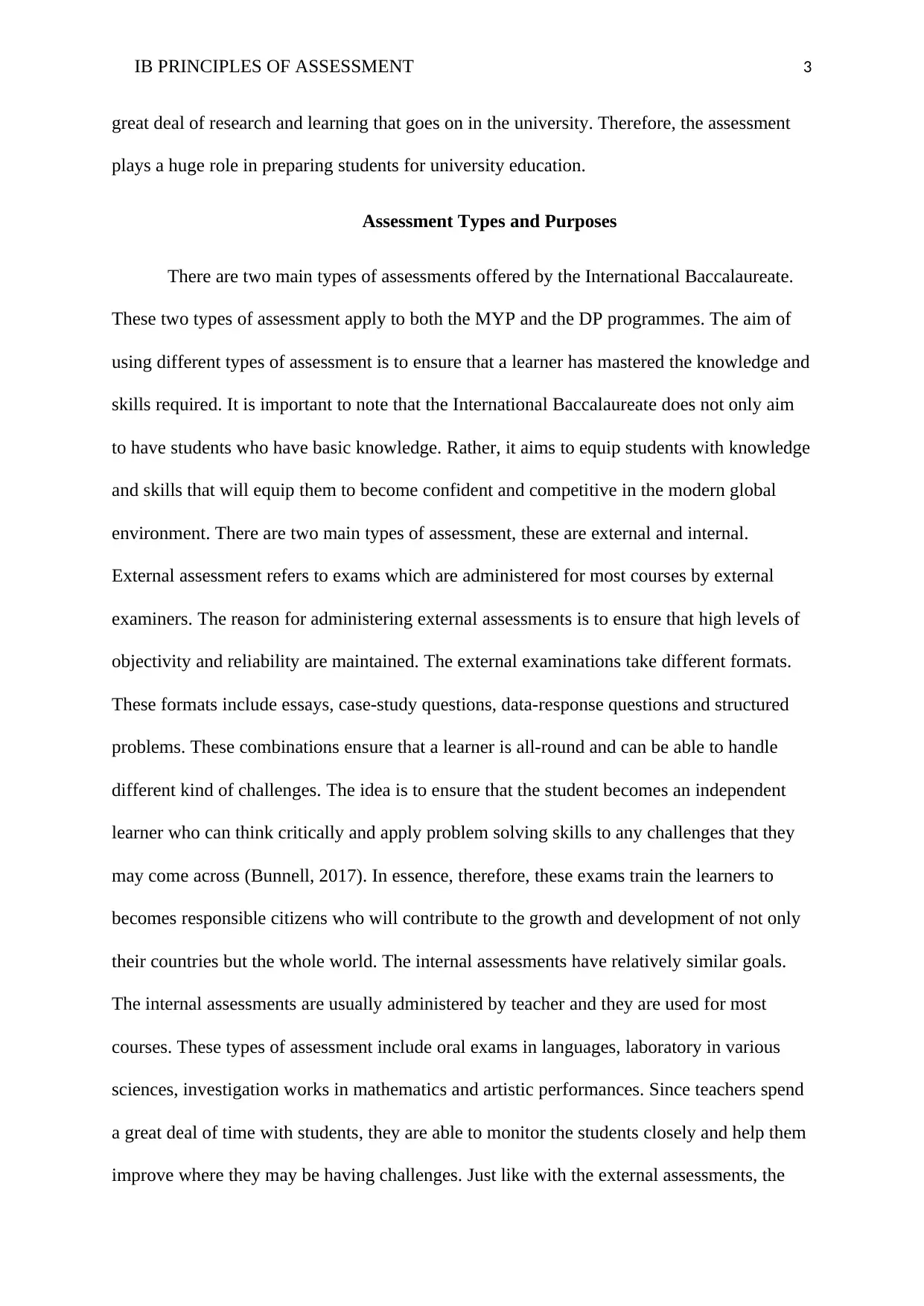
IB PRINCIPLES OF ASSESSMENT 3
great deal of research and learning that goes on in the university. Therefore, the assessment
plays a huge role in preparing students for university education.
Assessment Types and Purposes
There are two main types of assessments offered by the International Baccalaureate.
These two types of assessment apply to both the MYP and the DP programmes. The aim of
using different types of assessment is to ensure that a learner has mastered the knowledge and
skills required. It is important to note that the International Baccalaureate does not only aim
to have students who have basic knowledge. Rather, it aims to equip students with knowledge
and skills that will equip them to become confident and competitive in the modern global
environment. There are two main types of assessment, these are external and internal.
External assessment refers to exams which are administered for most courses by external
examiners. The reason for administering external assessments is to ensure that high levels of
objectivity and reliability are maintained. The external examinations take different formats.
These formats include essays, case-study questions, data-response questions and structured
problems. These combinations ensure that a learner is all-round and can be able to handle
different kind of challenges. The idea is to ensure that the student becomes an independent
learner who can think critically and apply problem solving skills to any challenges that they
may come across (Bunnell, 2017). In essence, therefore, these exams train the learners to
becomes responsible citizens who will contribute to the growth and development of not only
their countries but the whole world. The internal assessments have relatively similar goals.
The internal assessments are usually administered by teacher and they are used for most
courses. These types of assessment include oral exams in languages, laboratory in various
sciences, investigation works in mathematics and artistic performances. Since teachers spend
a great deal of time with students, they are able to monitor the students closely and help them
improve where they may be having challenges. Just like with the external assessments, the
great deal of research and learning that goes on in the university. Therefore, the assessment
plays a huge role in preparing students for university education.
Assessment Types and Purposes
There are two main types of assessments offered by the International Baccalaureate.
These two types of assessment apply to both the MYP and the DP programmes. The aim of
using different types of assessment is to ensure that a learner has mastered the knowledge and
skills required. It is important to note that the International Baccalaureate does not only aim
to have students who have basic knowledge. Rather, it aims to equip students with knowledge
and skills that will equip them to become confident and competitive in the modern global
environment. There are two main types of assessment, these are external and internal.
External assessment refers to exams which are administered for most courses by external
examiners. The reason for administering external assessments is to ensure that high levels of
objectivity and reliability are maintained. The external examinations take different formats.
These formats include essays, case-study questions, data-response questions and structured
problems. These combinations ensure that a learner is all-round and can be able to handle
different kind of challenges. The idea is to ensure that the student becomes an independent
learner who can think critically and apply problem solving skills to any challenges that they
may come across (Bunnell, 2017). In essence, therefore, these exams train the learners to
becomes responsible citizens who will contribute to the growth and development of not only
their countries but the whole world. The internal assessments have relatively similar goals.
The internal assessments are usually administered by teacher and they are used for most
courses. These types of assessment include oral exams in languages, laboratory in various
sciences, investigation works in mathematics and artistic performances. Since teachers spend
a great deal of time with students, they are able to monitor the students closely and help them
improve where they may be having challenges. Just like with the external assessments, the
⊘ This is a preview!⊘
Do you want full access?
Subscribe today to unlock all pages.

Trusted by 1+ million students worldwide
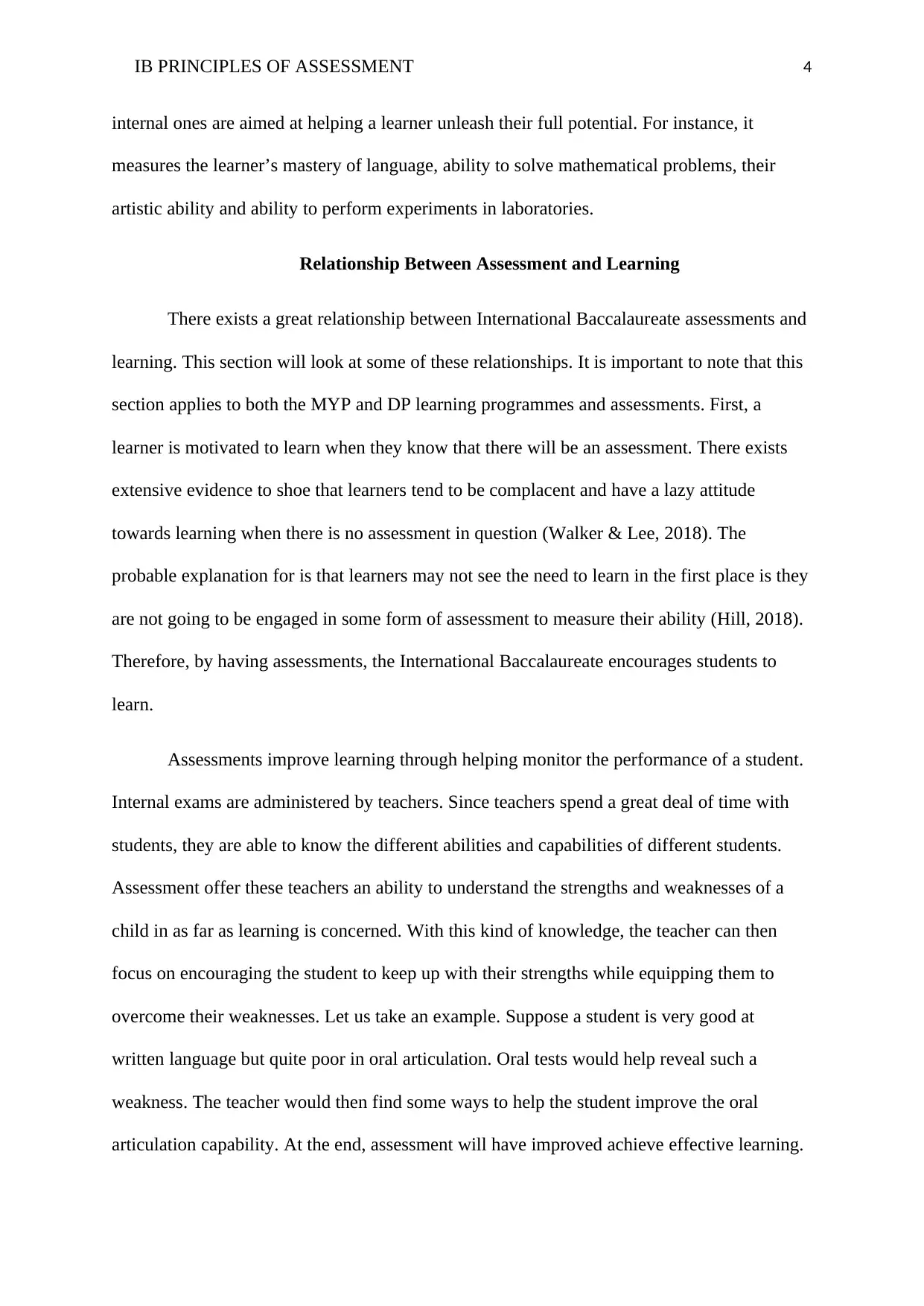
IB PRINCIPLES OF ASSESSMENT 4
internal ones are aimed at helping a learner unleash their full potential. For instance, it
measures the learner’s mastery of language, ability to solve mathematical problems, their
artistic ability and ability to perform experiments in laboratories.
Relationship Between Assessment and Learning
There exists a great relationship between International Baccalaureate assessments and
learning. This section will look at some of these relationships. It is important to note that this
section applies to both the MYP and DP learning programmes and assessments. First, a
learner is motivated to learn when they know that there will be an assessment. There exists
extensive evidence to shoe that learners tend to be complacent and have a lazy attitude
towards learning when there is no assessment in question (Walker & Lee, 2018). The
probable explanation for is that learners may not see the need to learn in the first place is they
are not going to be engaged in some form of assessment to measure their ability (Hill, 2018).
Therefore, by having assessments, the International Baccalaureate encourages students to
learn.
Assessments improve learning through helping monitor the performance of a student.
Internal exams are administered by teachers. Since teachers spend a great deal of time with
students, they are able to know the different abilities and capabilities of different students.
Assessment offer these teachers an ability to understand the strengths and weaknesses of a
child in as far as learning is concerned. With this kind of knowledge, the teacher can then
focus on encouraging the student to keep up with their strengths while equipping them to
overcome their weaknesses. Let us take an example. Suppose a student is very good at
written language but quite poor in oral articulation. Oral tests would help reveal such a
weakness. The teacher would then find some ways to help the student improve the oral
articulation capability. At the end, assessment will have improved achieve effective learning.
internal ones are aimed at helping a learner unleash their full potential. For instance, it
measures the learner’s mastery of language, ability to solve mathematical problems, their
artistic ability and ability to perform experiments in laboratories.
Relationship Between Assessment and Learning
There exists a great relationship between International Baccalaureate assessments and
learning. This section will look at some of these relationships. It is important to note that this
section applies to both the MYP and DP learning programmes and assessments. First, a
learner is motivated to learn when they know that there will be an assessment. There exists
extensive evidence to shoe that learners tend to be complacent and have a lazy attitude
towards learning when there is no assessment in question (Walker & Lee, 2018). The
probable explanation for is that learners may not see the need to learn in the first place is they
are not going to be engaged in some form of assessment to measure their ability (Hill, 2018).
Therefore, by having assessments, the International Baccalaureate encourages students to
learn.
Assessments improve learning through helping monitor the performance of a student.
Internal exams are administered by teachers. Since teachers spend a great deal of time with
students, they are able to know the different abilities and capabilities of different students.
Assessment offer these teachers an ability to understand the strengths and weaknesses of a
child in as far as learning is concerned. With this kind of knowledge, the teacher can then
focus on encouraging the student to keep up with their strengths while equipping them to
overcome their weaknesses. Let us take an example. Suppose a student is very good at
written language but quite poor in oral articulation. Oral tests would help reveal such a
weakness. The teacher would then find some ways to help the student improve the oral
articulation capability. At the end, assessment will have improved achieve effective learning.
Paraphrase This Document
Need a fresh take? Get an instant paraphrase of this document with our AI Paraphraser
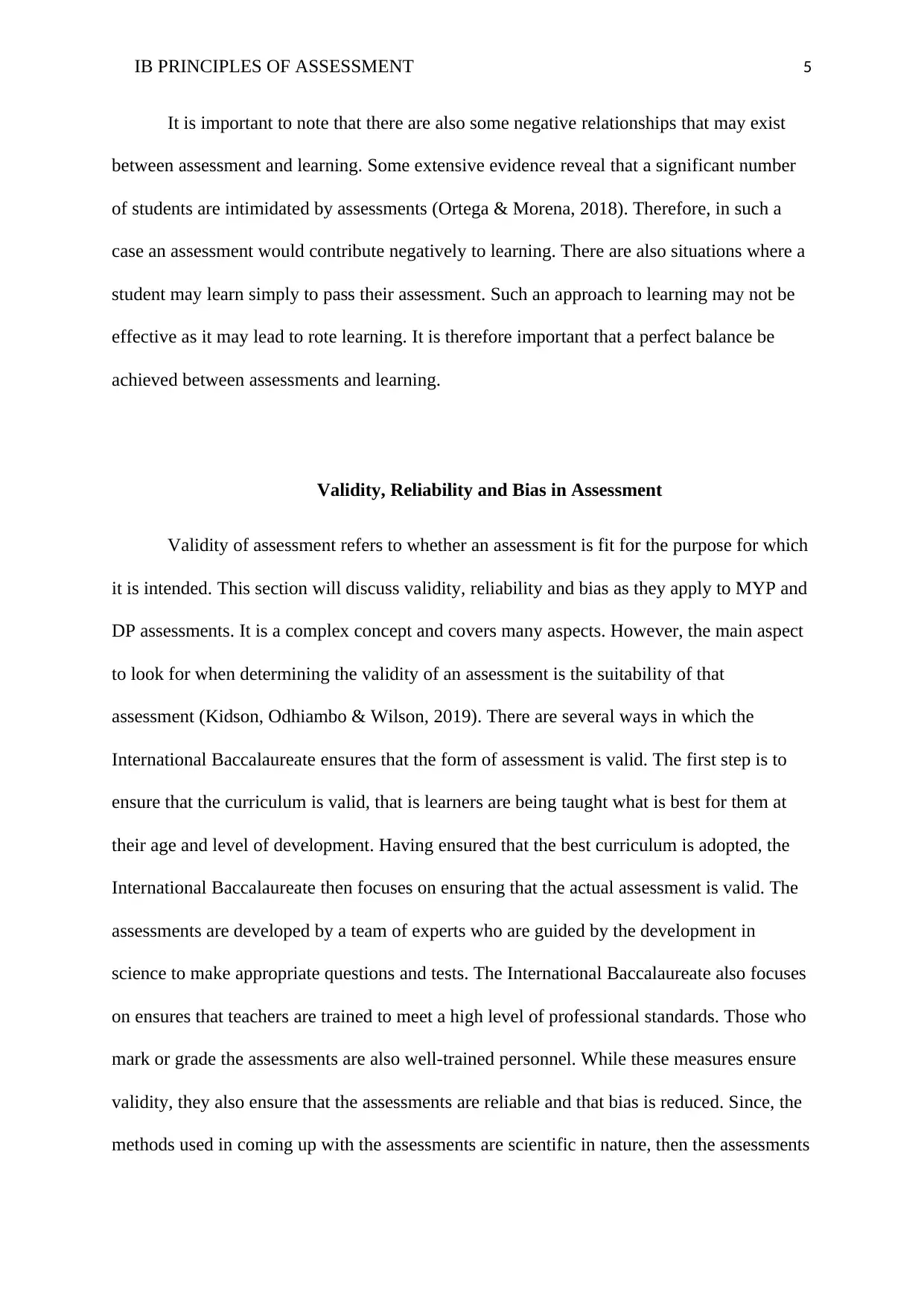
IB PRINCIPLES OF ASSESSMENT 5
It is important to note that there are also some negative relationships that may exist
between assessment and learning. Some extensive evidence reveal that a significant number
of students are intimidated by assessments (Ortega & Morena, 2018). Therefore, in such a
case an assessment would contribute negatively to learning. There are also situations where a
student may learn simply to pass their assessment. Such an approach to learning may not be
effective as it may lead to rote learning. It is therefore important that a perfect balance be
achieved between assessments and learning.
Validity, Reliability and Bias in Assessment
Validity of assessment refers to whether an assessment is fit for the purpose for which
it is intended. This section will discuss validity, reliability and bias as they apply to MYP and
DP assessments. It is a complex concept and covers many aspects. However, the main aspect
to look for when determining the validity of an assessment is the suitability of that
assessment (Kidson, Odhiambo & Wilson, 2019). There are several ways in which the
International Baccalaureate ensures that the form of assessment is valid. The first step is to
ensure that the curriculum is valid, that is learners are being taught what is best for them at
their age and level of development. Having ensured that the best curriculum is adopted, the
International Baccalaureate then focuses on ensuring that the actual assessment is valid. The
assessments are developed by a team of experts who are guided by the development in
science to make appropriate questions and tests. The International Baccalaureate also focuses
on ensures that teachers are trained to meet a high level of professional standards. Those who
mark or grade the assessments are also well-trained personnel. While these measures ensure
validity, they also ensure that the assessments are reliable and that bias is reduced. Since, the
methods used in coming up with the assessments are scientific in nature, then the assessments
It is important to note that there are also some negative relationships that may exist
between assessment and learning. Some extensive evidence reveal that a significant number
of students are intimidated by assessments (Ortega & Morena, 2018). Therefore, in such a
case an assessment would contribute negatively to learning. There are also situations where a
student may learn simply to pass their assessment. Such an approach to learning may not be
effective as it may lead to rote learning. It is therefore important that a perfect balance be
achieved between assessments and learning.
Validity, Reliability and Bias in Assessment
Validity of assessment refers to whether an assessment is fit for the purpose for which
it is intended. This section will discuss validity, reliability and bias as they apply to MYP and
DP assessments. It is a complex concept and covers many aspects. However, the main aspect
to look for when determining the validity of an assessment is the suitability of that
assessment (Kidson, Odhiambo & Wilson, 2019). There are several ways in which the
International Baccalaureate ensures that the form of assessment is valid. The first step is to
ensure that the curriculum is valid, that is learners are being taught what is best for them at
their age and level of development. Having ensured that the best curriculum is adopted, the
International Baccalaureate then focuses on ensuring that the actual assessment is valid. The
assessments are developed by a team of experts who are guided by the development in
science to make appropriate questions and tests. The International Baccalaureate also focuses
on ensures that teachers are trained to meet a high level of professional standards. Those who
mark or grade the assessments are also well-trained personnel. While these measures ensure
validity, they also ensure that the assessments are reliable and that bias is reduced. Since, the
methods used in coming up with the assessments are scientific in nature, then the assessments
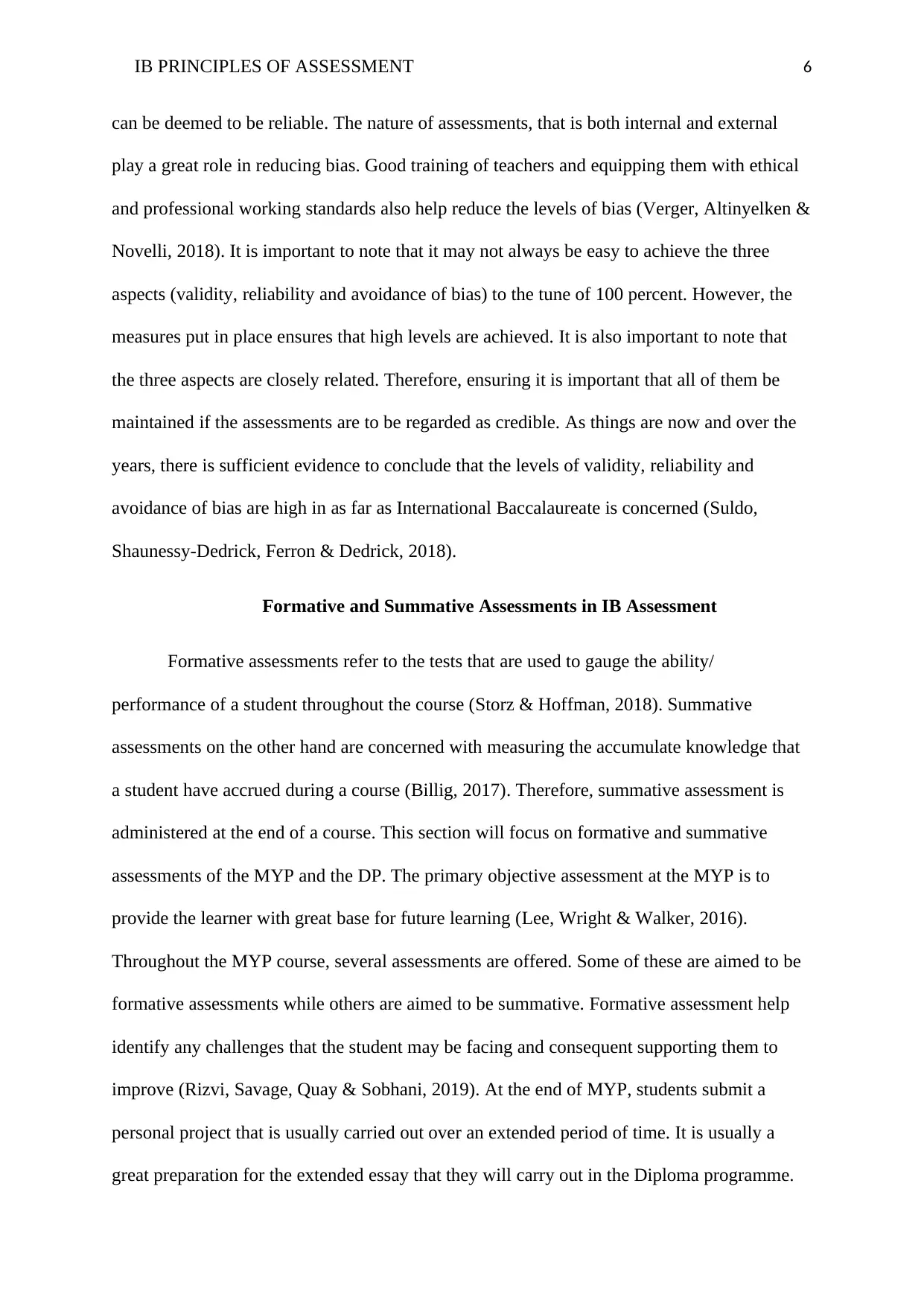
IB PRINCIPLES OF ASSESSMENT 6
can be deemed to be reliable. The nature of assessments, that is both internal and external
play a great role in reducing bias. Good training of teachers and equipping them with ethical
and professional working standards also help reduce the levels of bias (Verger, Altinyelken &
Novelli, 2018). It is important to note that it may not always be easy to achieve the three
aspects (validity, reliability and avoidance of bias) to the tune of 100 percent. However, the
measures put in place ensures that high levels are achieved. It is also important to note that
the three aspects are closely related. Therefore, ensuring it is important that all of them be
maintained if the assessments are to be regarded as credible. As things are now and over the
years, there is sufficient evidence to conclude that the levels of validity, reliability and
avoidance of bias are high in as far as International Baccalaureate is concerned (Suldo,
Shaunessy-Dedrick, Ferron & Dedrick, 2018).
Formative and Summative Assessments in IB Assessment
Formative assessments refer to the tests that are used to gauge the ability/
performance of a student throughout the course (Storz & Hoffman, 2018). Summative
assessments on the other hand are concerned with measuring the accumulate knowledge that
a student have accrued during a course (Billig, 2017). Therefore, summative assessment is
administered at the end of a course. This section will focus on formative and summative
assessments of the MYP and the DP. The primary objective assessment at the MYP is to
provide the learner with great base for future learning (Lee, Wright & Walker, 2016).
Throughout the MYP course, several assessments are offered. Some of these are aimed to be
formative assessments while others are aimed to be summative. Formative assessment help
identify any challenges that the student may be facing and consequent supporting them to
improve (Rizvi, Savage, Quay & Sobhani, 2019). At the end of MYP, students submit a
personal project that is usually carried out over an extended period of time. It is usually a
great preparation for the extended essay that they will carry out in the Diploma programme.
can be deemed to be reliable. The nature of assessments, that is both internal and external
play a great role in reducing bias. Good training of teachers and equipping them with ethical
and professional working standards also help reduce the levels of bias (Verger, Altinyelken &
Novelli, 2018). It is important to note that it may not always be easy to achieve the three
aspects (validity, reliability and avoidance of bias) to the tune of 100 percent. However, the
measures put in place ensures that high levels are achieved. It is also important to note that
the three aspects are closely related. Therefore, ensuring it is important that all of them be
maintained if the assessments are to be regarded as credible. As things are now and over the
years, there is sufficient evidence to conclude that the levels of validity, reliability and
avoidance of bias are high in as far as International Baccalaureate is concerned (Suldo,
Shaunessy-Dedrick, Ferron & Dedrick, 2018).
Formative and Summative Assessments in IB Assessment
Formative assessments refer to the tests that are used to gauge the ability/
performance of a student throughout the course (Storz & Hoffman, 2018). Summative
assessments on the other hand are concerned with measuring the accumulate knowledge that
a student have accrued during a course (Billig, 2017). Therefore, summative assessment is
administered at the end of a course. This section will focus on formative and summative
assessments of the MYP and the DP. The primary objective assessment at the MYP is to
provide the learner with great base for future learning (Lee, Wright & Walker, 2016).
Throughout the MYP course, several assessments are offered. Some of these are aimed to be
formative assessments while others are aimed to be summative. Formative assessment help
identify any challenges that the student may be facing and consequent supporting them to
improve (Rizvi, Savage, Quay & Sobhani, 2019). At the end of MYP, students submit a
personal project that is usually carried out over an extended period of time. It is usually a
great preparation for the extended essay that they will carry out in the Diploma programme.
⊘ This is a preview!⊘
Do you want full access?
Subscribe today to unlock all pages.

Trusted by 1+ million students worldwide
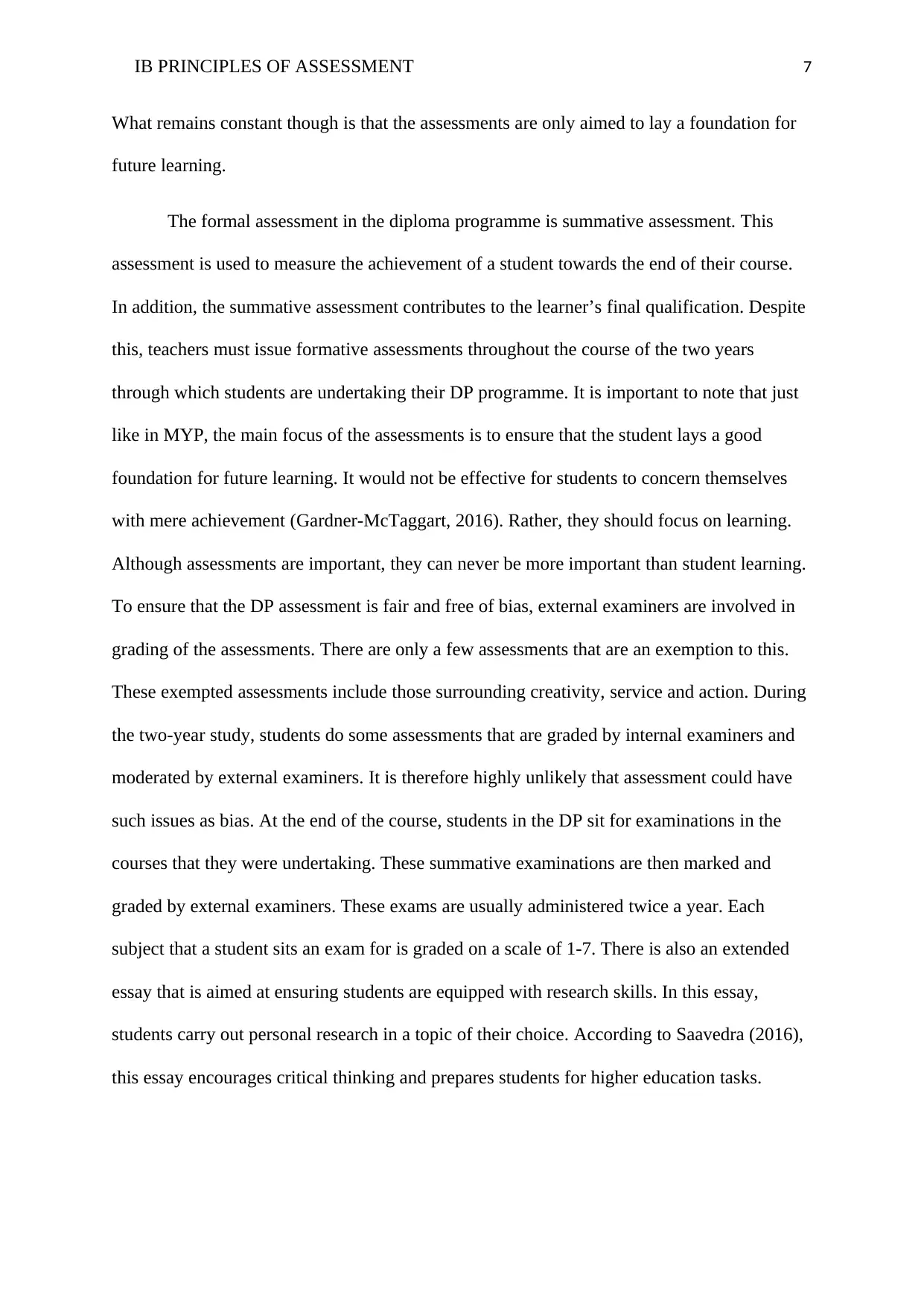
IB PRINCIPLES OF ASSESSMENT 7
What remains constant though is that the assessments are only aimed to lay a foundation for
future learning.
The formal assessment in the diploma programme is summative assessment. This
assessment is used to measure the achievement of a student towards the end of their course.
In addition, the summative assessment contributes to the learner’s final qualification. Despite
this, teachers must issue formative assessments throughout the course of the two years
through which students are undertaking their DP programme. It is important to note that just
like in MYP, the main focus of the assessments is to ensure that the student lays a good
foundation for future learning. It would not be effective for students to concern themselves
with mere achievement (Gardner-McTaggart, 2016). Rather, they should focus on learning.
Although assessments are important, they can never be more important than student learning.
To ensure that the DP assessment is fair and free of bias, external examiners are involved in
grading of the assessments. There are only a few assessments that are an exemption to this.
These exempted assessments include those surrounding creativity, service and action. During
the two-year study, students do some assessments that are graded by internal examiners and
moderated by external examiners. It is therefore highly unlikely that assessment could have
such issues as bias. At the end of the course, students in the DP sit for examinations in the
courses that they were undertaking. These summative examinations are then marked and
graded by external examiners. These exams are usually administered twice a year. Each
subject that a student sits an exam for is graded on a scale of 1-7. There is also an extended
essay that is aimed at ensuring students are equipped with research skills. In this essay,
students carry out personal research in a topic of their choice. According to Saavedra (2016),
this essay encourages critical thinking and prepares students for higher education tasks.
What remains constant though is that the assessments are only aimed to lay a foundation for
future learning.
The formal assessment in the diploma programme is summative assessment. This
assessment is used to measure the achievement of a student towards the end of their course.
In addition, the summative assessment contributes to the learner’s final qualification. Despite
this, teachers must issue formative assessments throughout the course of the two years
through which students are undertaking their DP programme. It is important to note that just
like in MYP, the main focus of the assessments is to ensure that the student lays a good
foundation for future learning. It would not be effective for students to concern themselves
with mere achievement (Gardner-McTaggart, 2016). Rather, they should focus on learning.
Although assessments are important, they can never be more important than student learning.
To ensure that the DP assessment is fair and free of bias, external examiners are involved in
grading of the assessments. There are only a few assessments that are an exemption to this.
These exempted assessments include those surrounding creativity, service and action. During
the two-year study, students do some assessments that are graded by internal examiners and
moderated by external examiners. It is therefore highly unlikely that assessment could have
such issues as bias. At the end of the course, students in the DP sit for examinations in the
courses that they were undertaking. These summative examinations are then marked and
graded by external examiners. These exams are usually administered twice a year. Each
subject that a student sits an exam for is graded on a scale of 1-7. There is also an extended
essay that is aimed at ensuring students are equipped with research skills. In this essay,
students carry out personal research in a topic of their choice. According to Saavedra (2016),
this essay encourages critical thinking and prepares students for higher education tasks.
Paraphrase This Document
Need a fresh take? Get an instant paraphrase of this document with our AI Paraphraser
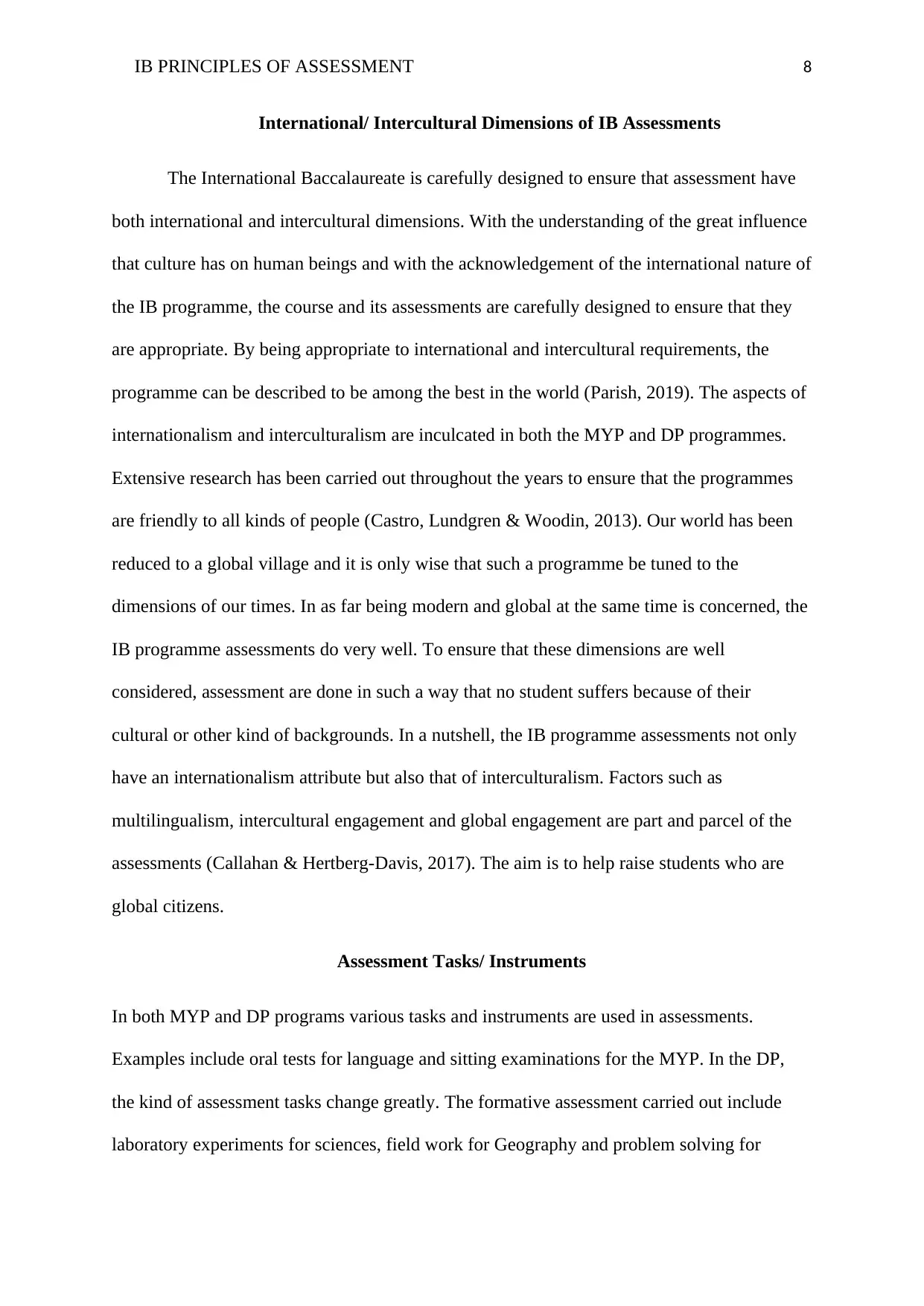
IB PRINCIPLES OF ASSESSMENT 8
International/ Intercultural Dimensions of IB Assessments
The International Baccalaureate is carefully designed to ensure that assessment have
both international and intercultural dimensions. With the understanding of the great influence
that culture has on human beings and with the acknowledgement of the international nature of
the IB programme, the course and its assessments are carefully designed to ensure that they
are appropriate. By being appropriate to international and intercultural requirements, the
programme can be described to be among the best in the world (Parish, 2019). The aspects of
internationalism and interculturalism are inculcated in both the MYP and DP programmes.
Extensive research has been carried out throughout the years to ensure that the programmes
are friendly to all kinds of people (Castro, Lundgren & Woodin, 2013). Our world has been
reduced to a global village and it is only wise that such a programme be tuned to the
dimensions of our times. In as far being modern and global at the same time is concerned, the
IB programme assessments do very well. To ensure that these dimensions are well
considered, assessment are done in such a way that no student suffers because of their
cultural or other kind of backgrounds. In a nutshell, the IB programme assessments not only
have an internationalism attribute but also that of interculturalism. Factors such as
multilingualism, intercultural engagement and global engagement are part and parcel of the
assessments (Callahan & Hertberg-Davis, 2017). The aim is to help raise students who are
global citizens.
Assessment Tasks/ Instruments
In both MYP and DP programs various tasks and instruments are used in assessments.
Examples include oral tests for language and sitting examinations for the MYP. In the DP,
the kind of assessment tasks change greatly. The formative assessment carried out include
laboratory experiments for sciences, field work for Geography and problem solving for
International/ Intercultural Dimensions of IB Assessments
The International Baccalaureate is carefully designed to ensure that assessment have
both international and intercultural dimensions. With the understanding of the great influence
that culture has on human beings and with the acknowledgement of the international nature of
the IB programme, the course and its assessments are carefully designed to ensure that they
are appropriate. By being appropriate to international and intercultural requirements, the
programme can be described to be among the best in the world (Parish, 2019). The aspects of
internationalism and interculturalism are inculcated in both the MYP and DP programmes.
Extensive research has been carried out throughout the years to ensure that the programmes
are friendly to all kinds of people (Castro, Lundgren & Woodin, 2013). Our world has been
reduced to a global village and it is only wise that such a programme be tuned to the
dimensions of our times. In as far being modern and global at the same time is concerned, the
IB programme assessments do very well. To ensure that these dimensions are well
considered, assessment are done in such a way that no student suffers because of their
cultural or other kind of backgrounds. In a nutshell, the IB programme assessments not only
have an internationalism attribute but also that of interculturalism. Factors such as
multilingualism, intercultural engagement and global engagement are part and parcel of the
assessments (Callahan & Hertberg-Davis, 2017). The aim is to help raise students who are
global citizens.
Assessment Tasks/ Instruments
In both MYP and DP programs various tasks and instruments are used in assessments.
Examples include oral tests for language and sitting examinations for the MYP. In the DP,
the kind of assessment tasks change greatly. The formative assessment carried out include
laboratory experiments for sciences, field work for Geography and problem solving for
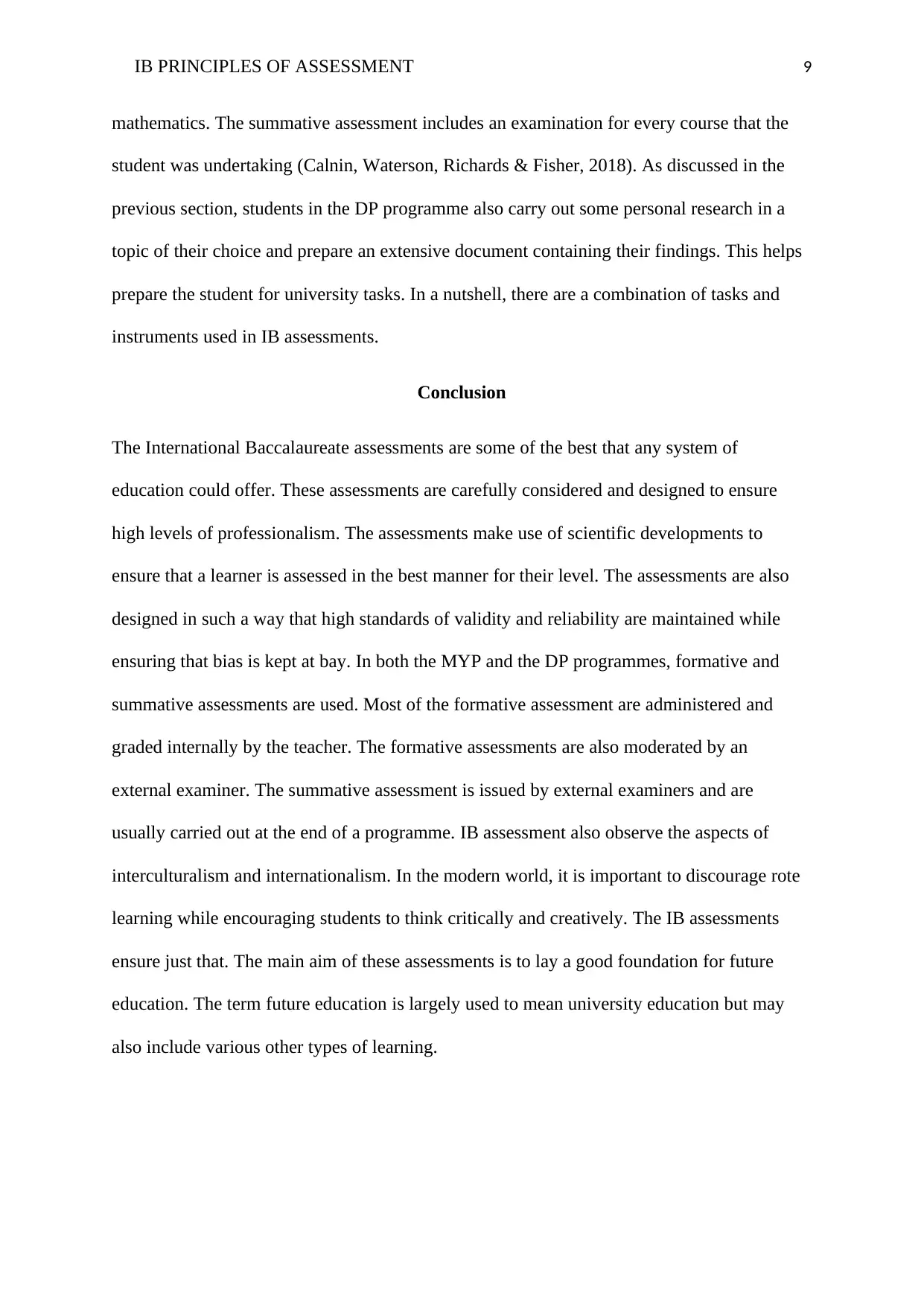
IB PRINCIPLES OF ASSESSMENT 9
mathematics. The summative assessment includes an examination for every course that the
student was undertaking (Calnin, Waterson, Richards & Fisher, 2018). As discussed in the
previous section, students in the DP programme also carry out some personal research in a
topic of their choice and prepare an extensive document containing their findings. This helps
prepare the student for university tasks. In a nutshell, there are a combination of tasks and
instruments used in IB assessments.
Conclusion
The International Baccalaureate assessments are some of the best that any system of
education could offer. These assessments are carefully considered and designed to ensure
high levels of professionalism. The assessments make use of scientific developments to
ensure that a learner is assessed in the best manner for their level. The assessments are also
designed in such a way that high standards of validity and reliability are maintained while
ensuring that bias is kept at bay. In both the MYP and the DP programmes, formative and
summative assessments are used. Most of the formative assessment are administered and
graded internally by the teacher. The formative assessments are also moderated by an
external examiner. The summative assessment is issued by external examiners and are
usually carried out at the end of a programme. IB assessment also observe the aspects of
interculturalism and internationalism. In the modern world, it is important to discourage rote
learning while encouraging students to think critically and creatively. The IB assessments
ensure just that. The main aim of these assessments is to lay a good foundation for future
education. The term future education is largely used to mean university education but may
also include various other types of learning.
mathematics. The summative assessment includes an examination for every course that the
student was undertaking (Calnin, Waterson, Richards & Fisher, 2018). As discussed in the
previous section, students in the DP programme also carry out some personal research in a
topic of their choice and prepare an extensive document containing their findings. This helps
prepare the student for university tasks. In a nutshell, there are a combination of tasks and
instruments used in IB assessments.
Conclusion
The International Baccalaureate assessments are some of the best that any system of
education could offer. These assessments are carefully considered and designed to ensure
high levels of professionalism. The assessments make use of scientific developments to
ensure that a learner is assessed in the best manner for their level. The assessments are also
designed in such a way that high standards of validity and reliability are maintained while
ensuring that bias is kept at bay. In both the MYP and the DP programmes, formative and
summative assessments are used. Most of the formative assessment are administered and
graded internally by the teacher. The formative assessments are also moderated by an
external examiner. The summative assessment is issued by external examiners and are
usually carried out at the end of a programme. IB assessment also observe the aspects of
interculturalism and internationalism. In the modern world, it is important to discourage rote
learning while encouraging students to think critically and creatively. The IB assessments
ensure just that. The main aim of these assessments is to lay a good foundation for future
education. The term future education is largely used to mean university education but may
also include various other types of learning.
⊘ This is a preview!⊘
Do you want full access?
Subscribe today to unlock all pages.

Trusted by 1+ million students worldwide
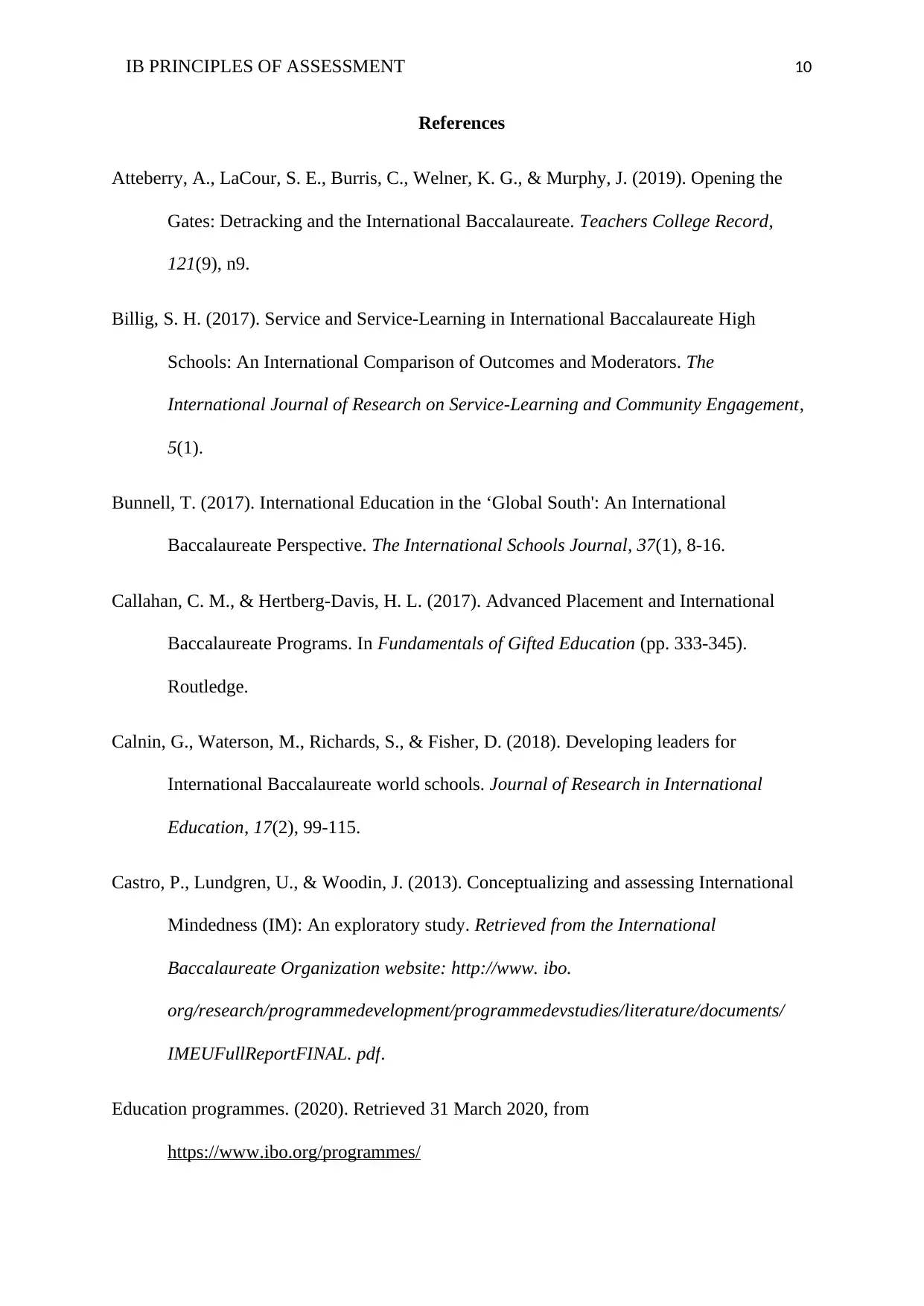
IB PRINCIPLES OF ASSESSMENT 10
References
Atteberry, A., LaCour, S. E., Burris, C., Welner, K. G., & Murphy, J. (2019). Opening the
Gates: Detracking and the International Baccalaureate. Teachers College Record,
121(9), n9.
Billig, S. H. (2017). Service and Service-Learning in International Baccalaureate High
Schools: An International Comparison of Outcomes and Moderators. The
International Journal of Research on Service-Learning and Community Engagement,
5(1).
Bunnell, T. (2017). International Education in the ‘Global South': An International
Baccalaureate Perspective. The International Schools Journal, 37(1), 8-16.
Callahan, C. M., & Hertberg-Davis, H. L. (2017). Advanced Placement and International
Baccalaureate Programs. In Fundamentals of Gifted Education (pp. 333-345).
Routledge.
Calnin, G., Waterson, M., Richards, S., & Fisher, D. (2018). Developing leaders for
International Baccalaureate world schools. Journal of Research in International
Education, 17(2), 99-115.
Castro, P., Lundgren, U., & Woodin, J. (2013). Conceptualizing and assessing International
Mindedness (IM): An exploratory study. Retrieved from the International
Baccalaureate Organization website: http://www. ibo.
org/research/programmedevelopment/programmedevstudies/literature/documents/
IMEUFullReportFINAL. pdf.
Education programmes. (2020). Retrieved 31 March 2020, from
https://www.ibo.org/programmes/
References
Atteberry, A., LaCour, S. E., Burris, C., Welner, K. G., & Murphy, J. (2019). Opening the
Gates: Detracking and the International Baccalaureate. Teachers College Record,
121(9), n9.
Billig, S. H. (2017). Service and Service-Learning in International Baccalaureate High
Schools: An International Comparison of Outcomes and Moderators. The
International Journal of Research on Service-Learning and Community Engagement,
5(1).
Bunnell, T. (2017). International Education in the ‘Global South': An International
Baccalaureate Perspective. The International Schools Journal, 37(1), 8-16.
Callahan, C. M., & Hertberg-Davis, H. L. (2017). Advanced Placement and International
Baccalaureate Programs. In Fundamentals of Gifted Education (pp. 333-345).
Routledge.
Calnin, G., Waterson, M., Richards, S., & Fisher, D. (2018). Developing leaders for
International Baccalaureate world schools. Journal of Research in International
Education, 17(2), 99-115.
Castro, P., Lundgren, U., & Woodin, J. (2013). Conceptualizing and assessing International
Mindedness (IM): An exploratory study. Retrieved from the International
Baccalaureate Organization website: http://www. ibo.
org/research/programmedevelopment/programmedevstudies/literature/documents/
IMEUFullReportFINAL. pdf.
Education programmes. (2020). Retrieved 31 March 2020, from
https://www.ibo.org/programmes/
Paraphrase This Document
Need a fresh take? Get an instant paraphrase of this document with our AI Paraphraser
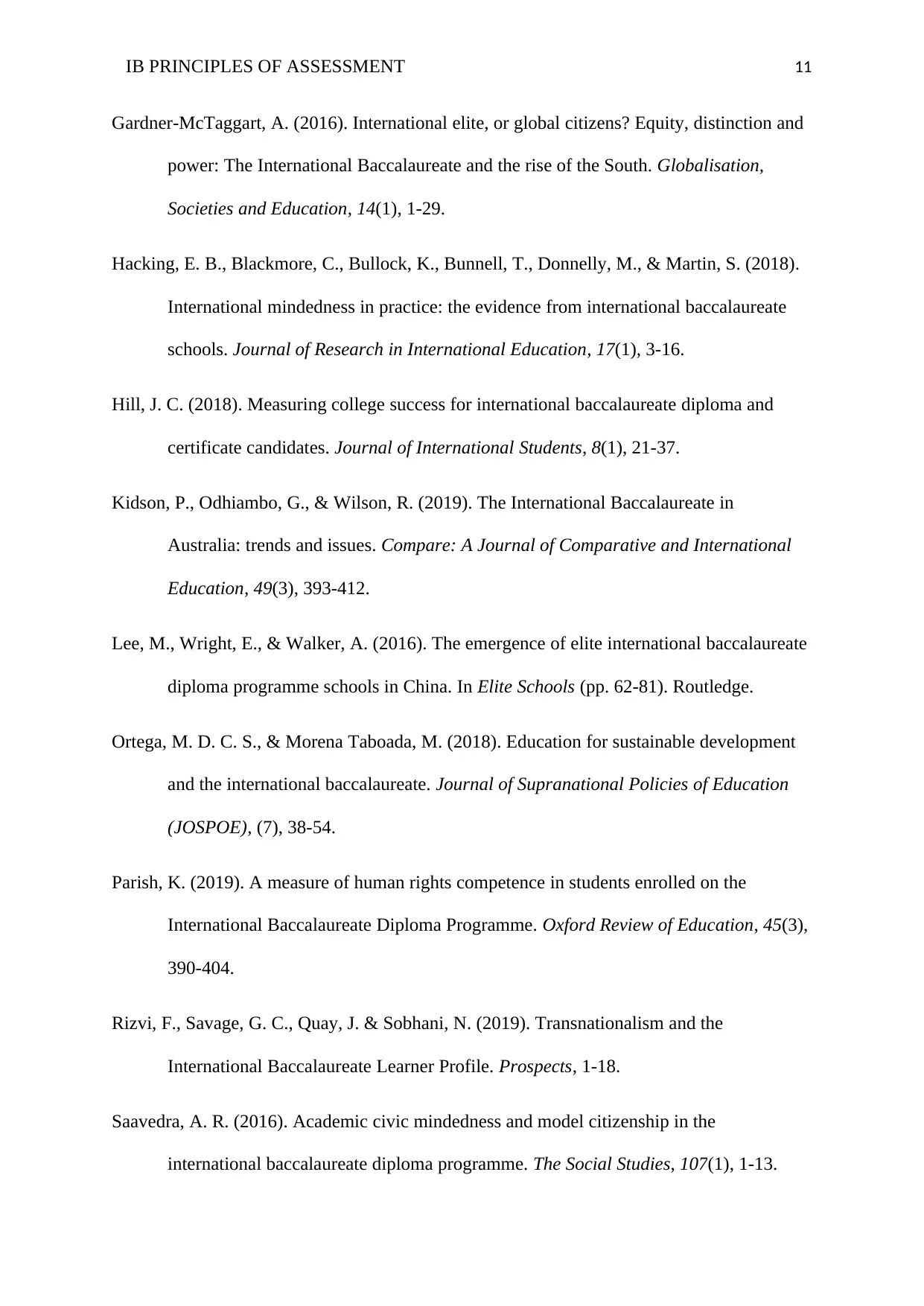
IB PRINCIPLES OF ASSESSMENT 11
Gardner-McTaggart, A. (2016). International elite, or global citizens? Equity, distinction and
power: The International Baccalaureate and the rise of the South. Globalisation,
Societies and Education, 14(1), 1-29.
Hacking, E. B., Blackmore, C., Bullock, K., Bunnell, T., Donnelly, M., & Martin, S. (2018).
International mindedness in practice: the evidence from international baccalaureate
schools. Journal of Research in International Education, 17(1), 3-16.
Hill, J. C. (2018). Measuring college success for international baccalaureate diploma and
certificate candidates. Journal of International Students, 8(1), 21-37.
Kidson, P., Odhiambo, G., & Wilson, R. (2019). The International Baccalaureate in
Australia: trends and issues. Compare: A Journal of Comparative and International
Education, 49(3), 393-412.
Lee, M., Wright, E., & Walker, A. (2016). The emergence of elite international baccalaureate
diploma programme schools in China. In Elite Schools (pp. 62-81). Routledge.
Ortega, M. D. C. S., & Morena Taboada, M. (2018). Education for sustainable development
and the international baccalaureate. Journal of Supranational Policies of Education
(JOSPOE), (7), 38-54.
Parish, K. (2019). A measure of human rights competence in students enrolled on the
International Baccalaureate Diploma Programme. Oxford Review of Education, 45(3),
390-404.
Rizvi, F., Savage, G. C., Quay, J. & Sobhani, N. (2019). Transnationalism and the
International Baccalaureate Learner Profile. Prospects, 1-18.
Saavedra, A. R. (2016). Academic civic mindedness and model citizenship in the
international baccalaureate diploma programme. The Social Studies, 107(1), 1-13.
Gardner-McTaggart, A. (2016). International elite, or global citizens? Equity, distinction and
power: The International Baccalaureate and the rise of the South. Globalisation,
Societies and Education, 14(1), 1-29.
Hacking, E. B., Blackmore, C., Bullock, K., Bunnell, T., Donnelly, M., & Martin, S. (2018).
International mindedness in practice: the evidence from international baccalaureate
schools. Journal of Research in International Education, 17(1), 3-16.
Hill, J. C. (2018). Measuring college success for international baccalaureate diploma and
certificate candidates. Journal of International Students, 8(1), 21-37.
Kidson, P., Odhiambo, G., & Wilson, R. (2019). The International Baccalaureate in
Australia: trends and issues. Compare: A Journal of Comparative and International
Education, 49(3), 393-412.
Lee, M., Wright, E., & Walker, A. (2016). The emergence of elite international baccalaureate
diploma programme schools in China. In Elite Schools (pp. 62-81). Routledge.
Ortega, M. D. C. S., & Morena Taboada, M. (2018). Education for sustainable development
and the international baccalaureate. Journal of Supranational Policies of Education
(JOSPOE), (7), 38-54.
Parish, K. (2019). A measure of human rights competence in students enrolled on the
International Baccalaureate Diploma Programme. Oxford Review of Education, 45(3),
390-404.
Rizvi, F., Savage, G. C., Quay, J. & Sobhani, N. (2019). Transnationalism and the
International Baccalaureate Learner Profile. Prospects, 1-18.
Saavedra, A. R. (2016). Academic civic mindedness and model citizenship in the
international baccalaureate diploma programme. The Social Studies, 107(1), 1-13.
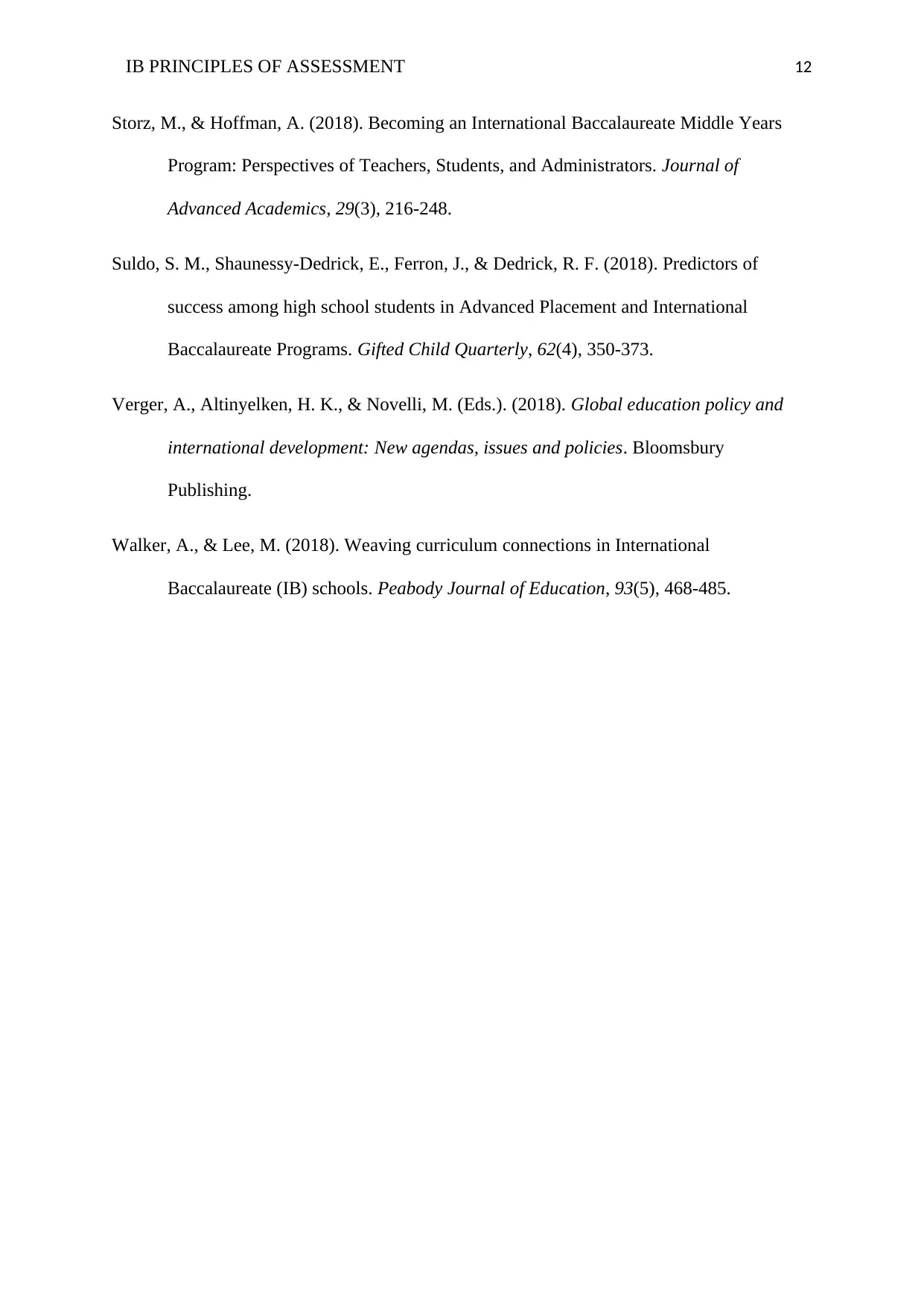
IB PRINCIPLES OF ASSESSMENT 12
Storz, M., & Hoffman, A. (2018). Becoming an International Baccalaureate Middle Years
Program: Perspectives of Teachers, Students, and Administrators. Journal of
Advanced Academics, 29(3), 216-248.
Suldo, S. M., Shaunessy-Dedrick, E., Ferron, J., & Dedrick, R. F. (2018). Predictors of
success among high school students in Advanced Placement and International
Baccalaureate Programs. Gifted Child Quarterly, 62(4), 350-373.
Verger, A., Altinyelken, H. K., & Novelli, M. (Eds.). (2018). Global education policy and
international development: New agendas, issues and policies. Bloomsbury
Publishing.
Walker, A., & Lee, M. (2018). Weaving curriculum connections in International
Baccalaureate (IB) schools. Peabody Journal of Education, 93(5), 468-485.
Storz, M., & Hoffman, A. (2018). Becoming an International Baccalaureate Middle Years
Program: Perspectives of Teachers, Students, and Administrators. Journal of
Advanced Academics, 29(3), 216-248.
Suldo, S. M., Shaunessy-Dedrick, E., Ferron, J., & Dedrick, R. F. (2018). Predictors of
success among high school students in Advanced Placement and International
Baccalaureate Programs. Gifted Child Quarterly, 62(4), 350-373.
Verger, A., Altinyelken, H. K., & Novelli, M. (Eds.). (2018). Global education policy and
international development: New agendas, issues and policies. Bloomsbury
Publishing.
Walker, A., & Lee, M. (2018). Weaving curriculum connections in International
Baccalaureate (IB) schools. Peabody Journal of Education, 93(5), 468-485.
⊘ This is a preview!⊘
Do you want full access?
Subscribe today to unlock all pages.

Trusted by 1+ million students worldwide
1 out of 12
Related Documents
Your All-in-One AI-Powered Toolkit for Academic Success.
+13062052269
info@desklib.com
Available 24*7 on WhatsApp / Email
![[object Object]](/_next/static/media/star-bottom.7253800d.svg)
Unlock your academic potential
© 2024 | Zucol Services PVT LTD | All rights reserved.





